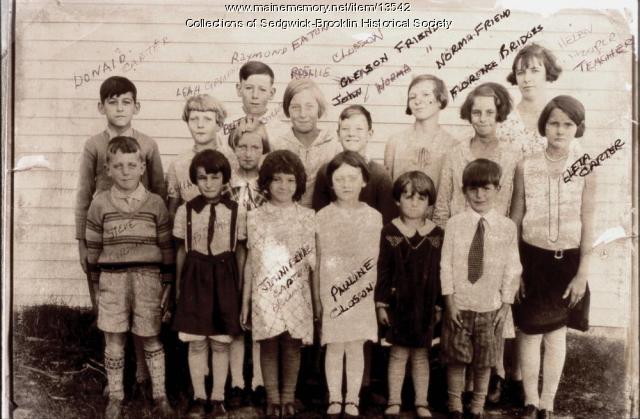Keywords: Rose Window
- Historical Items (3)
- Tax Records (0)
- Architecture & Landscape (0)
- Online Exhibits (12)
- Site Pages (9)
- My Maine Stories (3)
- Lesson Plans (0)
Online Exhibits
Your results include these online exhibits. You also can view all of the site's exhibits, view a timeline of selected events in Maine History, and learn how to create your own exhibit. See featured exhibits or create your own exhibit
Exhibit
Women at the turn of the 20th century were increasingly involved in paid work outside the home. For wage-earning women in the Old Port section of Portland, the jobs ranged from canning fish and vegetables to setting type. A study done in 1907 found many women did not earn living wages.
Exhibit
The West Baldwin Methodist Church, founded in 1826, was one of three original churches in Baldwin. While its location has remained the same, the church has undergone numerous changes to serve the changing community.
Exhibit
Reading, Writing and 'Rithmetic: Brooklin Schools
When Brooklin, located on the Blue Hill Peninsula, was incorporated in 1849, there were ten school districts and nine one-room school houses. As the years went by, population changes affected the location and number of schools in the area. State requirements began to determine ways that student's education would be handled. Regardless, education of the Brooklin students always remained a high priority for the town.
Exhibit
Photographer Elijah Cobb's 1985 portfolio of the Laura E. Richards House, with text by Rosalind Cobb Wiggins and Laura E. Putnam.
Exhibit
Sagadahoc County through the Eastern Eye
The Eastern Illustrating and Publishing Company of Belfast, Maine. employed photographers who traveled by company vehicle through New England each summer, taking pictures of towns and cities, vacation spots and tourist attractions, working waterfronts and local industries, and other subjects postcard recipients might enjoy. The cards were printed by the millions in Belfast into the 1940s.
Exhibit
A Riot of Words: Ballads, Posters, Proclamations and Broadsides
Imagine a day 150 years ago. Looking down a side street, you see the buildings are covered with posters and signs.
Exhibit
Since the establishment of the area's first licensed hotel in 1681, Portland has had a dramatic, grand and boisterous hotel tradition. The Portland hotel industry has in many ways reflected the growth and development of the city itself. As Portland grew with greater numbers of people moving through the city or calling it home, the hotel business expanded to fit the increasing demand.
Exhibit
Dressing Up, Standing Out, Fitting In
Adorning oneself to look one's "best" has varied over time, gender, economic class, and by event. Adornments suggest one's sense of identity and one's intent to stand out or fit in.
Exhibit
Maine Eats: the food revolution starts here
From Maine's iconic lobsters, blueberries, potatoes, apples, and maple syrup, to local favorites like poutine, baked beans, red hot dogs, Italian sandwiches, and Whoopie Pies, Maine's identity and economy are inextricably linked to food. Sourcing food, preparing food, and eating food are all part of the heartbeat of Maine's culture and economy. Now, a food revolution is taking us back to our roots in Maine: to the traditional sources, preparation, and pleasures of eating food that have sustained Mainers for millennia.
Exhibit
CODE RED: Climate, Justice & Natural History Collections
Explore topics around climate change by reuniting collections from one of the nation's earliest natural history museums, the Portland Society of Natural History. The exhibition focuses on how museums collect, and the role of humans in creating changes in society, climate, and biodiversity.
Exhibit
World War I and the Maine Experience
With a long history of patriotism and service, Maine experienced the war in a truly distinct way. Its individual experiences tell the story of not only what it means to be an American, but what it means to be from Maine during the war to end all wars.
Exhibit
One Hundred Years of Caring -- EMMC
In 1892 five physicians -- William H. Simmons, William C. Mason, Walter H. Hunt, Everett T. Nealey, and William E. Baxter -- realized the need for a hospital in the city of Bangor had become urgent and they set about providing one.












